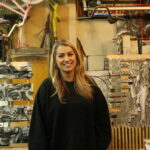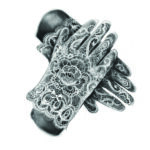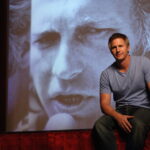I am a fat man and I was a fat child and I’ll likely be a fat corpse until the worms take their tribute. I amassed most of my girth in Colorado, gorging during boyhood on the traditional foods indigenous to the high plains: Sonic cheesy tots, assorted McDonalds dollar menu menagerie, footlong Safeway party subs assembled as a hail mary to sell all that was about to go bad.
Food was always important to me, but our relationship was perverted by the emphasis my grandfather put on bounty. Ova Tallent was a good man, probably the best man I’ve ever known, but his love language was gluttony and he loved me a lot. Grandpa spent his orphaned childhood escaping Dust Bowl Kansas on eastbound trains, hopping freighters to and from the textile mills in Philadelphia where he worked to support his younger brothers. While romanticized in popular culture, believe it or not, the actual life of a child hobo was rough. Deprivation defined his existence, and though he became a successful adult, he never rose beyond his itinerant tastes. As the old adage goes, you can take the lil’ drifter out of the boxcar, but you’ll have to take the can of Vienna sausages from his cold, dead, nitrate-bloated hands.
His refrigerator was stocked with Pepsi cans, microwave burritos and Jimmy Dean sausage links, and his shelves were haunted by Fritos, Town House crackers and Kit-Kats. There were no governors put on our childhood appetites. Ova Tallent had nothing as a child. His grandchildren never went without. The pantry was a lawless place and inside of it we were decadent. Boxes of Hostess cupcakes disappeared. Bags of Cheetos vanished. It was nothing to down an entire six pack of Cherry Pepsi over the course of a single episode of Maury — that was just another day at the office (aside: the hardest I’ve ever seen someone laugh over a prolonged period was when my grandfather watched an episode of Maury called “My Baby Weighs 99 Lbs.” As the title implies, the show featured beleaguered parents of preposterously fat children. The first child to appear on screen couldn’t walk. Whether it was due to his age or his crippling obesity I can’t remember, but he had to be carted out in a wheelbarrow. From the pigchild’s first appearance until the end of the episode, my grandfather rocked with laughter as the enormous children sat in a pen on the soundstage struggling to play with each other. Many of the children lacked the core strength to keep their overburdened frames upright, rendering them recumbent. An overhead camera angle of the children nearly killed Grandpa. He choked and wheezed, collecting himself long enough to force out “Get those worms some dirt” before collapsing back in his chair. My grandfather was not a cruel man, but the sight of the dough children tickled him like the finger of God. His laugh was of the silent variety, an odd rolling phenomenon that caused his belly to bounce as his giant red hands wiped tears into his muttonchops. During commercial breaks, he attempted to gather himself, punctuating his efforts with the errant “Shit” or “Goddamn,” but his resolve was no match for Maury, because as soon as the show came back, he was reduced to rubble by another medically unwell child, this time placed next to an award winning pumpkin or, in the most lurid offering from the day’s freakshow, a still photograph of a child wallowing in a kiddy pool of baked beans.)
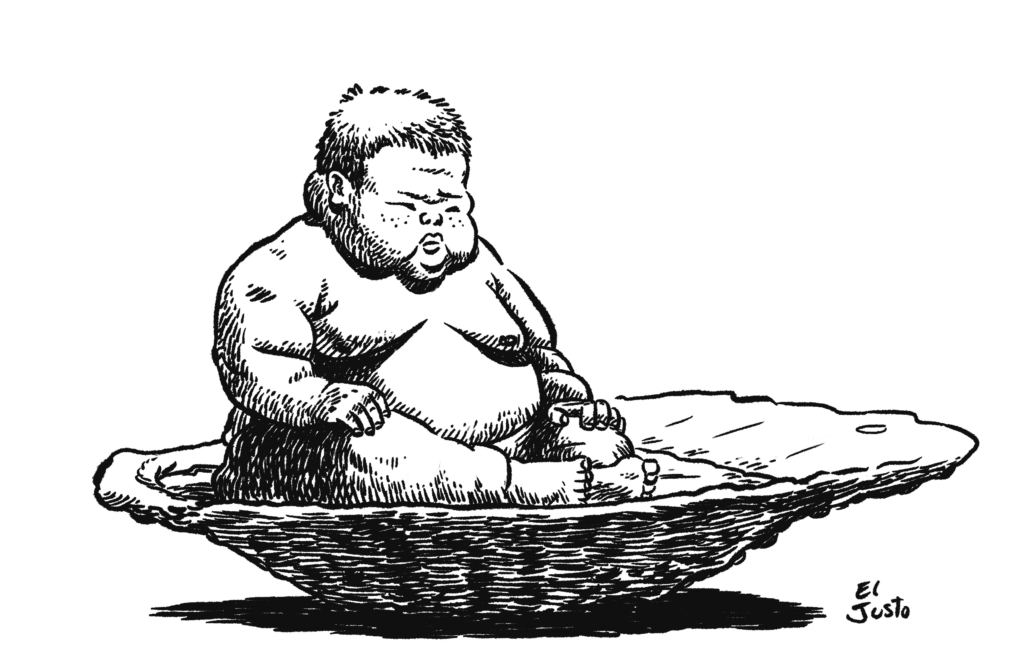
Illustration by Justin Rentería
From the age of solid food until I turned eighteen, I’d wager less than one hundred total days of my life passed without eating a meal at my grandparents’. My brain grew there, uncorrupted before I introduced intoxicants to my diet. Those synapses house my clearest vision of childhood. I can still feel the grit of the horsehair-like netting on the underside of my grandmother’s prized vinyl dollar store tablecloth. I can taste the effervescent anticipation bubbling out of a fresh cracked RC Cola. I sincerely hope that when I die my brain delivers me the final parting gift of tortillas frying.
Growing up in Elizabeth, Colorado, population 986, their small house was the center of my smaller world. Within the handbuilt walls my grandfather erected, my belief system was codified. Much of what my grandfather taught me was invaluable — only integrity is more valuable than family, you can outwork what you may naturally lack — but it was also underneath his tree that I learned to value volume over quality, and I ran that maxim to its bleeding edge. More than once I menaced Pizza Hut lunch buffets past the point of vomiting. When the offensive line platooned to Chipotle, I ate burritos two at a time to show dominance. The gnarliest personification of this thinking was the sense of pride I felt chugging beers.
Being feral children of the plains, we held our soirees in abandoned acreage and drank to oblivion beneath the hard white stars. The most popular open-space was called Africa or The Drums, and we gathered there in our secondhand cars to revel in the firelight burning off the pallets we stole from Safeway. The field was our church and Keystone Light was our sacrament; no one drank them faster than me. I ripped those cans open with the deadeyed fervor of a freakshow geek biting the heads off chickens. I achieved highly in school and sport, but the respect I gained binge-drinking was the purest form of affirmation, more intoxicating than six beers in six minutes and ultimately more dangerous. I carried this habit into adulthood, an arrow in my stunted quiver. More than once I weaponized my prowess, fleecing ignorant marks into dead money wagers when my band needed gas money. The stories of my victories were recounted like bleak legends.
“This is my buddy Sam. He drank thirty beers in Buffalo, New York, and didn’t even barf.”
As sad as it is to say now, drinking beers faster than anyone else was My Thing and it lingered beyond adolescence because, as a stand-up comedian, I didn’t need to grow up. I have no doubts I would have fully devolved into a totally unrealized wet-brained slug if not for the grace of two women: my mother and my wife. The pure beauty of their love acted as a prism and projected through them I was able to see the individual beams of the light that comprised me and in witnessing my rainbow, I realized I was beautiful, too.
My mother was a serious woman. She trusted few people and befriended fewer. I was lucky because I was born into her inner circle. She was an excellent mother, generous, loving, encouraging, involved. I doubt anyone who was lucky enough to be close to her would ever describe her as warm, but to those she deemed worthy (she suffered no fools and didn’t believe in accidents), she was beloved and loyal to the point of fealty. It’s a minor miracle that she ever shared her genetic code with my father, not because they were incompatible, but because they never should have met in the first place.
Lisbeth Tallent was a product of Cleveland in the sixties. She’d been to Paris, New York, London, San Francisco. Her erudite tastes stood incongruous with the prevailing wisdom of rural Colorado. The events that led her to live in Elizabeth were the stuff of a Tom Robbins novel, a madcap adventure, all so very 1970s, from Cleveland to Kent State to SeaWorld to mother. The way she told it to me, she was relocating to Portland, Oregon, from Florida when she ran out of gas in Colorado. She took a job with the Federal Reserve to save enough money to finish the move. She met my dad when they were both bank examiners in Pueblo, and my father, a man of immaculate taste, knew immediately that he’d never met anyone like her before. They fell in love and after attempting newlywed life on the Western Slope they relocated to Elizabeth to raise their babies where my father grew up.
I know she loved my dad because she hated where he was from. My mother was not quiet in her disdain for the place that became her home until she died. Elizabeth was “a small town for smaller minds” and she made sure her children were aware of the world beyond. We didn’t have money but she spared no expense in broadening us. This wanderlust (along with a diamond-hard self-resolve and an eager willingness to exchange limited cash for glimpses of the good life) was the greatest gift she gave me. We vacationed in Boston and Quebec City and Ana Maria Island, Florida. In fifth grade, I wrote a mystery story about a Cajun detective in the French Quarter. When my teacher accused me of plagiarism, not only did my mother tell her to go fuck herself, she took me on a trip to New Orleans to spike the proverbial football. Over gator tail and mint juleps and her beloved oysters Rockefeller, I fell desperately in love with the Crescent City, a place to which I’ve returned at least annually for the last eighteen years. NOLA — a despised acronym the citizens of New Orleans never deign utter aloud — is my favorite place in America, a place of reverence and importance, the place where I first drank coffee, the place where my wife proposed to me, the place where I last vacationed with my mother before she died.
On election night 2016, a stroke reduced my mother to a paperdoll facsimile. My family restructured around our wounded matriarch, and, while her speech and autonomy were limited, she still knew how to live and demanded the highest quality. My most precious memory from the post-stroke period is rightfully of my mother in New Orleans. In March 2020, my wife Doctor Emily Tallent, DO, then a fourth year med student, arranged to rotate through a hospital in the city. We, along with my parents, spent a week in the big house on Royal before the world ceased. Those earliest, scariest days of the pandemic were universally surreal, but the high strangeness was exacerbated by the French Quarter’s sudden desolation. Bourbon Street, typically agreed to be the loudest place in the world, echoed with dreamlike silence as we spent the days and nights rotating behind my mother’s wheelchair, alternately pushing her up and down the Mississippi like settlers of a fallen world. After so many years spent in the city of bleary-eyed riot, to have the streets to ourselves was a perverse blessing. My father photographed every inch of the Quarter without anyone betting him they could guess where he got his shoes. My wife learned how to make a mojito that rivaled anything the Carousel Bar ever produced at a fifth of the price. I even tried jogging a few times — it was truly a new world. But for my mother, whose life was already too small and quiet, the novelty wore off quickly: she had the least time to waste.
After a week without fine dining, my mother was quite literally ready to die for oysters. My wife repeatedly and patiently explained the risks of the new virus to her mother-in-law, underlining how it was even more dangerous to the already compromised populations, but my mother, showing a flash of the doggedly hardheaded woman I knew her to be as a boy, finally rolled her eyes one day, gathered her coat and began step-dragging herself out of the door in her wheelchair. We stopped her of course, but we also immediately went to the internet to source oysters. My wife located A Guy and we bought bags of the little monsters for pennies on the dollar from his pickup truck. A few YouTube shucking tutorials had us ready for the line at Antoine’s and after eating them raw to the point of boredom, Emily, ever the hero, learned how to bake them to my mother’s specifications, and the woman who was notoriously hard to please smiled, burped and reached for another concrete projection of my wife’s love for her, burning her fingers on the shell.
When I started this essay, I intended to write a seething indictment of the Denver restaurant scene and the divide between quality food and fine dining in a city that wants so badly to be taken seriously on the world stage. Upon finishing this essay, I realize I objectively failed such an exposé. Instead I wrote something good.
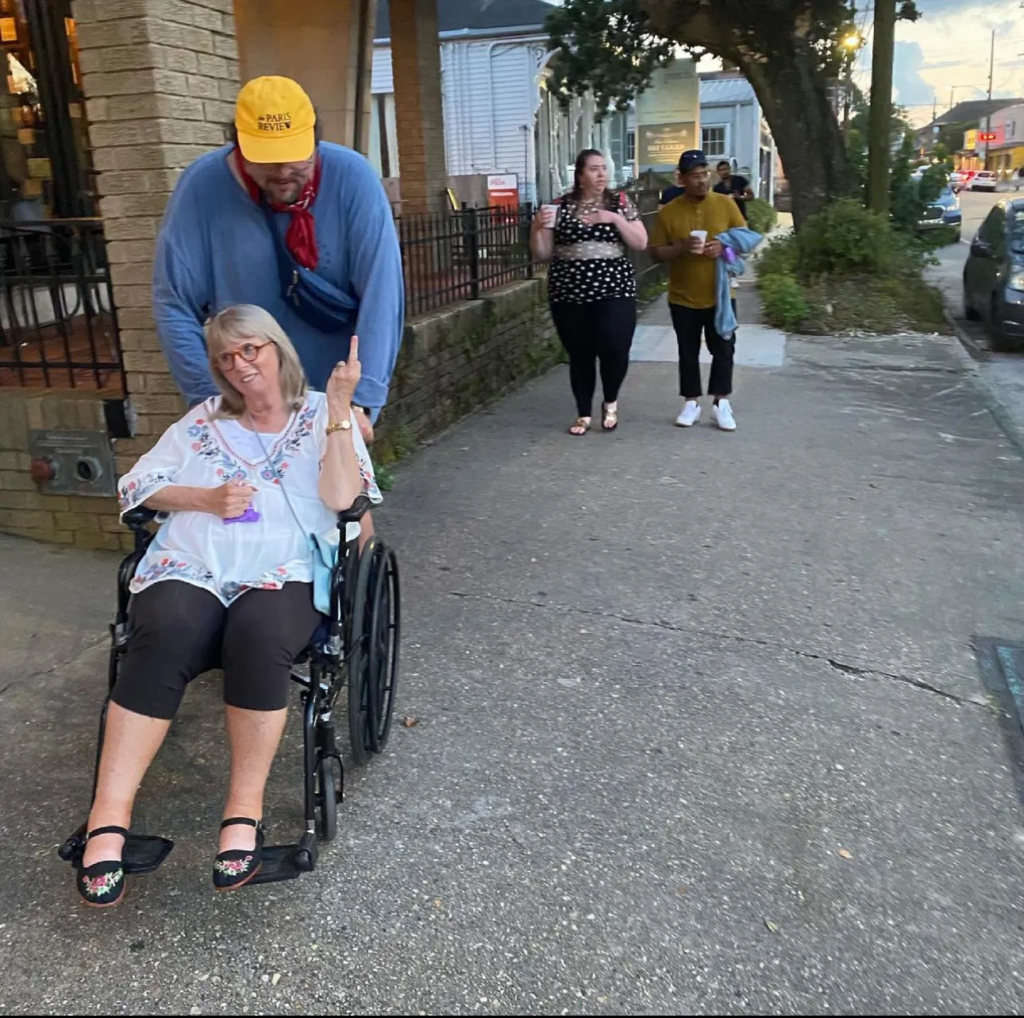
~Sam Tallent. La Junta, Colo. March 25, 2024

Sam Tallent
Sam Tallent is a comedian. He is the author of the novel Running The Light and the novella Attaboy. He was born and raised in Elizabeth, Colorado. He cooks dinner for his wife every night.


